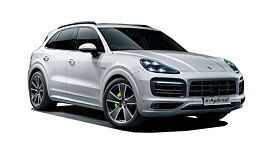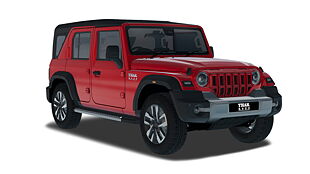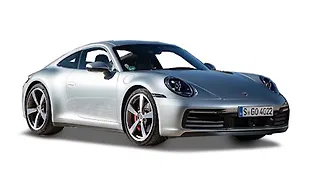Introduction
Nine thousand revolutions per minute. That's how high the Porsche 911 GT3 RS revs! And it hits this rpm limit with such speed, savagery, and aural intensity, that one can feel the revs tingling the bones. It is motoring at its purest, almost analogue best. It is one of those 'must-experience' motoring moments one has to check off the bucket list. I did. And then swam in endorphins till I hit the bed that night.

But, of course, I didn't just sit there and rev the RS' near-520bhp, four-litre, flat-six, naturally aspirated engine; I actually drove it. Hard. At the Buddh International Circuit or BIC. And it was momentous. Now, I will get to that in a bit, but you'd agree if one doesn't have close to Rs 3 crore to spare, driving a GT3 RS on a race track without having to worry about tyres or brakes or liquid gold is as rare as winning an argument with your four-year-old. It rarely happens.
For me - and a few other journalists - it did happen, courtesy of Porsche India's Track Day Experience. It's an event Porsche does for its owners, prospects, and fans wherein the participants have access to the German car maker's lineup of sports cars or SUVs or Taycans in one place. We had all three. But that's not all. The experience also included training drills to help the participants better understand the cars and to drive them more effectively.
It started with a classroom session.
The Training

After Porsche's trainers, who are experienced motorsport guys, told us how to sit in the car and hold the steering correctly for dynamic driving, it was time for the 'warm up'. That included three drills - Cornering, Handling, and Braking.

Cornering, as the name suggests, is to help understand the fastest way around a corner. It involved accelerating flat out to the braking marker, then braking hard till the turn-in point, followed by turning and hitting the apex, and then exiting the corner by applying progressive throttle while simultaneously unwinding the steering.

Braking and obstacle avoidance was a much easier exercise. It only involved accelerating flat out towards a line of cones, slamming the brakes and turning simultaneously to avoid hitting the said cones. Finally, we were timed around a makeshift handling course to improve our eye-hand-throttle coordination. The latter also prepares you for what comes next - track time!
Track Time

I started mine in the Macan GTS. It makes 440 horsepower and has a claimed 0-100kmph time of 4.5 seconds. So yes, it is fast. But, as luck would have it, courtesy of a slower group up front and a slightly risk-averse lead car driver/trainer, my track time in the GTS was more like a lazy Sunday afternoon drive than full-blown tyre squealing festivities.
Thankfully, by the time I had moved from the Cayenne Turbo to the most powerful car on track - the Panamera Turbo S - the track was clear, and our trainer was feeling generous. We still didn't go all out, but we did drive the four-door fast enough to appreciate its balance, its quick turn-in ability, and the near catapult effect that its engine and intelligent all-wheel drive deliver on corner exits.

However, it was when we changed groups and moved to the sportscars that I came to appreciate the true genius of a Porsche on a race track. I was in the 718 Spyder. Now, I agree, its headlining figures are nowhere close to the Panamera, and it does make 'only' 420bhp compared to the Panamera's near-630. But, it is an open-top version of the Cayman GT4, which has to count for something. On the track, with its naturally aspirated engine that revs close to 8,000rpm, its manual gearbox, and its mid-engine layout, it was devastatingly good.

For starters, the pedal box on the 718 is beautifully thought-out. So, even though the car gets the auto-blip function for downshifts, one doesn't need it because heel-and-toeing feels so natural and effortless. The gear shifter is ideally located as well, and though its shifts weren't as crisp as I had imagined, the short throw and the little bit of effort required to make those shifts add to the aura of driving something more mechanical and direct.
What's more, 718 is two cars in one.

When you want to stitch together a fast and precise lap, the 718 can behave like a point-and-shoot tool. It will hit every mark - turn-in, apex, and it will dance on the edge of the curb at corner exits without putting a wheel wrong - and deliver a satisfying lap. But when you are in the mood of an eight-year-old, it will play along happily, too. With over 400bhp, rear-wheel-drive, and a mid-engine layout, one can back it in entering a corner, get it sideways mid-corner with well-judged lift-off oversteer, and then get the tail to hang out on power with its rear tyres lit up as it drifts out of corners with smoke and grace.
My laps in the 718 were easily the best thing that had happened to me that day.
The GT3 RS Magic
That's till I got behind the wheel of the GT3 RS. Just to clarify, the GT3 we drove is the previous generation car. Not that it matters much because this one is still sensational. For those not in the know, a GT3 is a lighter, more track-focused version of the 911 Carrera. And adding RS to the name gives the same car more power, more aero aids, and in our case, no aircon.

But just the visual presence of the RS will make anyone with any inclination towards cars go weak in the knees immediately. The proportions, the lines, and all the drama with spoilers and splitters, and scoops and vents, not to mention those gorgeous wheels shod with cut slicks, give the car a sense of occasion that's difficult to match.
What's even more difficult to emulate is the way a GT3 RS drives.

It's not luxurious or pampering. And it's not too forgiving, either. It's fast and demanding, and at times, a tad violent. And, in the right hands, it's near impossible to catch on a track. On the BIC, I was blown away by the accuracy, preciseness, and immediacy of the RS' turn-in. Its ability to whisper into the driver's ear exactly what it's going to do. And, how early and aggressively it allows you to get on the throttle on corner exits.

Now, it does have a dinner table for a rear wing and rear tyres so fat and grippy, these would make drag cars do a double take. So it's not completely surprising that it sticks to the tarmac with such tenacity. What is surprising, however, is that even with so much grip, the engine - when you prod it enough - can still get the RS' rear to unstick; and unstick it does nicely.
Foot Note

We also drove the all-electric Taycan around the BIC. But honestly, after the Panamera, it felt quite lacklustre. Agreed, this was the 326bhp, rear-wheel drive, entry-level spec car, and the full-blown Taycan Turbo S with close to 760bhp and a 0-100kmph time of under three seconds might have blown our minds. But, our takeaway after driving this basic version was that it needs to go some distance before it can hold a candle to its petrol-powered brethren. Then be it dynamics or the emotive co-efficient.

































